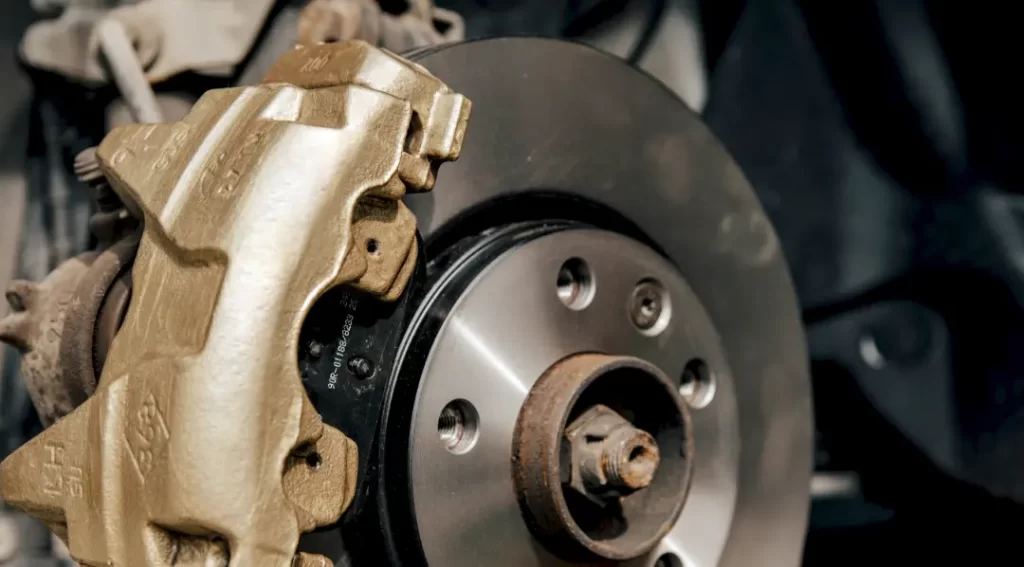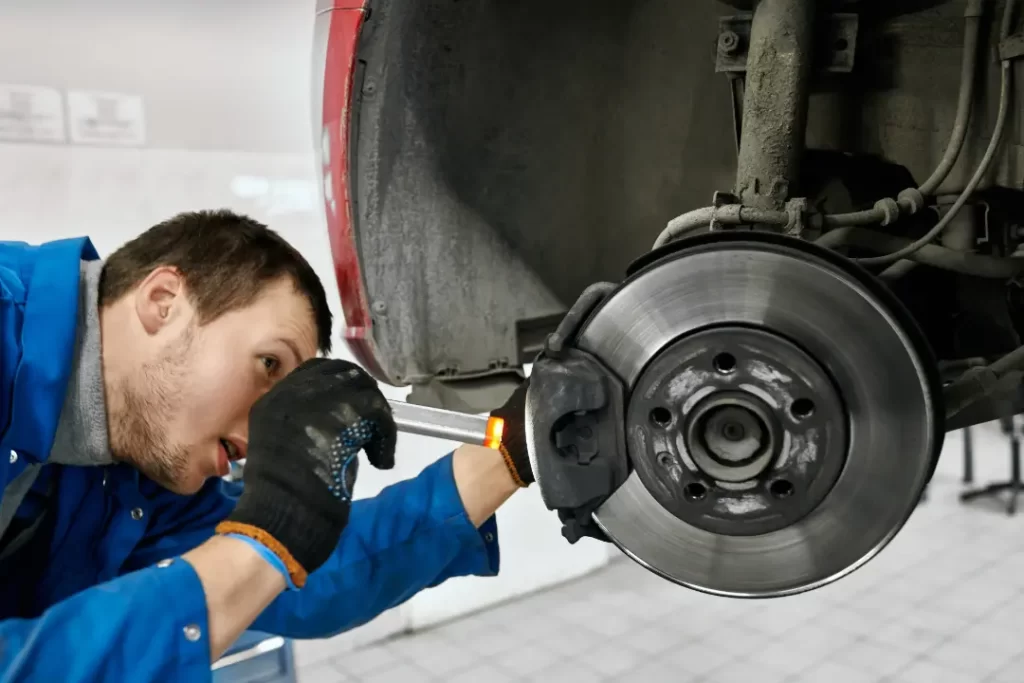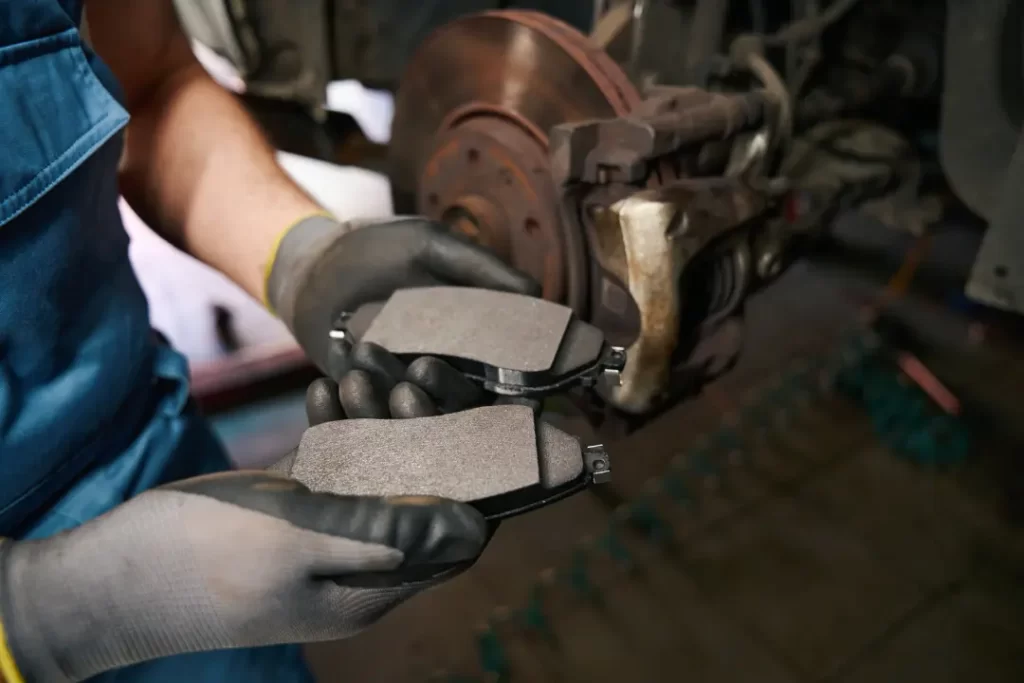How often should you replace your car brakes? For various vehicles, the general range of 30,000 to 70,000 miles is a good starting point.
Factors such as your driving style, terrain, and vehicle type can all impact this timeline. Read on to learn about the key indicators for brake pad wear, how to extend their life, and steps for effective brake maintenance.
Key Takeaways
- Brake pad lifespan is affected by driving habits, vehicle weight, and brake system components. Regular maintenance is essential for optimal performance and safety.
- Worn brake pads signal the need for inspection or replacement through audible noises (squealing, grinding), visual cues, braking performance alterations, or dashboard warning lights.
- Brake pads typically require professional inspection every 10,000 miles or annually, with brakes checked and replacement needed every 30,000 to 70,000 miles depending on use, and choosing quality parts and professional services ensures safety and reliability.
Understanding Brake Pad Function and Lifespan
Brake pads are essential components of your vehicle’s braking system. When you press the brake pedal, it create friction against the brake discs to stop the vehicle.
Various factors affect the lifespan of your own brake pads, including the materials used, such as ceramics or metal particles, and the pressure and heat they experience during use.
Regular maintenance is crucial for ensuring your brake pads perform effectively and are always ready when needed.

The Role of Brake Pads in Your Vehicle’s Safety
Your car brakes are essential components that ensure your vehicle stops safely when you want it to. Each time you press the brake pedal, hydraulic fluid in the callipers activates the brake pads, which create friction against the rotating disc brakes to reduce speed and bring your car to a stop. Knowing when to change brake pads is important for maintaining performance and safety.
This process of deceleration is vital for your vehicle’s safety, highlighting the need to keep your brake pads in good condition. The ability to stop safely relies on the pressure applied and the quality of friction between the brake pad and the disc.
Factors Affecting Brake Pad Durability
The lifespan of your brake pads is affected by several factors. Heavy braking can lead to a shorter lifespan, as it requires more from the pads. The weight of your vehicle also influences its durability, requiring more effort from the brake pads to perform effectively.
The condition of other parts of the braking system, such as the rotors and callipers, is crucial for optimal performance.
Whether you are driving in the city with frequent stops or on the highway, the type of brake pads you use, whether ceramic or metallic, will impact how quickly they wear out.
Brake System Components: Overview of Essential Brake Parts
The vehicle’s braking system consists of several key components working together to ensure safe stopping. The brake pads press against the brake discs to create the friction necessary for stopping. The brake discs, or rotors, are the metal surfaces that the pads contact, converting kinetic energy into heat.
The brake callipers hold the brake pads and pistons, ensuring they press against the discs correctly. Lastly, the brake fluid transmits the pressure from the brake pedal to the callipers, allowing all components to function together.
Understanding these parts is essential for maintaining and repairing your braking system, ensuring your vehicle stops effectively.
Relationship Between Parts and Maintenance Requirements
The components of your braking system work together to ensure proper functionality. The brake pads must be compatible with the brake discs, and the brake fluid must be the right type and viscosity to effectively transmit pressure.
Regular maintenance is crucial. This includes checking the brake pads for wear, inspecting the brake discs for damage, and replacing the brake fluid as recommended. The brake system warning light on your dashboard alerts you to potential issues such as low brake fluid or worn-out brake pads.
By understanding how these components interact and following a regular maintenance schedule, you can avoid costly repairs and keep your vehicle’s braking system functioning properly.
What Are the Signs of Worn Brake Pads?
Your brake pads will show warning signs when they are nearing the end of their lifespan. You may hear a high-pitched squealing noise, which indicates that the pads are getting thin, or a grinding sound that signifies that the pads have worn down to their backing plate.
Visually, if the friction material is thinner than a quarter inch, it’s time to replace your brake pads. Additionally, symptoms such as your vehicle pulling to one side, vibrations in the steering wheel, or uneven wear on the pads indicate that the brake system needs attention due to wear.
Ignoring these warning signs can lead to more serious and expensive issues, where damaged components can turn a simple brake pad replacement into a complicated repair.
Strange Noises: Squeals and Grinding Noises
When your vehicle’s brakes start making screeching or grinding sounds, it indicates a problem rather than a compliment to your driving skills. These sounds often signal an urgent need for brake pad replacement. Grinding noises specifically mean that the friction material has worn down so much that metal is contacting metal, which can lead to a compromised braking system.
While some noises may occur temporarily due to damp conditions, consistent squeals and grinding require immediate inspection. To prevent further damage, take these warnings seriously and check the condition of your brake pads.
Performance Shifts: Braking Responsiveness and Pedal Feel
A change in your vehicle’s brake performance indicates that it may be time to inspect your brake pads. If the brake pedal feels spongy or if your vehicle pulls to one side, these are clear signs of potential brake pad wear. Such issues affect your ride and can compromise your safety.
Additionally, regular changes to your brake fluid are necessary to maintain the effectiveness of your braking system and to prevent internal corrosion and sediment buildup that can lead to reduced performance.
When to Inspect and Replace Brake Pads
Regularly inspecting your brake pads is essential for safe driving. It’s recommended to have a professional check your brake pads every 10,000 miles or annually during vehicle servicing to ensure they are in good condition. If the pad thickness is less than 7 millimetres, it’s time to replace them to maintain your vehicle’s safety.
When the brake warning light on the dashboard comes on, it is a signal to take immediate action. This may mean you need to replace your brake pads and potentially the warning sensor as well.

Regular Checks and Maintenance Schedules
In everyday life, it’s easy to overlook the importance of regular brake pad checks, but maintaining a maintenance schedule is essential for your vehicle’s safety.
Professional inspections should be a regular part of your vehicle care routine, with brake pads checked at least once a year or every 10,000 miles. Without sensors to indicate their wear, brake pads depend on a professional’s expertise to assess their condition and ensure that your vehicle remains safe on the road.
Consider scheduling brake inspections every six months to a year, based on your driving frequency, to avoid costly repairs.
Mileage Milestones for Brake Pad Replacement
The lifespan of brake pads is typically measured in miles, with no strict guidelines depending on driving conditions. Generally, brake pads should be replaced between 30,000 to 70,000 miles, though this can vary based on driving style.
Urban drivers who often stop and start may need to replace their brake pads around 30,000 to 35,000 miles, while those who mostly drive on highways may extend this to 80,000 miles or more.
For personalised guidance, expert advice is available on when to replace brake pads, ensuring your vehicle’s braking system meets your driving needs.
Impact of Driving Style on Brake Longevity
Your driving habits affect the wear and tear on your brake pads and other braking components. Aggressive driving, with frequent hard braking and rapid acceleration, puts more strain on the brake pads and discs.
Driving in urban areas with frequent stops can also lead to faster wear. In contrast, driving in light traffic or on highways reduces the wear on your braking system. By adopting a smoother driving style, you can extend the life of your brake pads and other components.
Regularly checking the brake pads and discs for wear and replacing them as needed can help prevent costly repairs and maintain your vehicle’s braking system.
Additionally, consider upgrading to high-quality brake pads, such as organic or ceramic options, which offer better performance and a longer lifespan. By being mindful of your driving habits and maintaining your braking system, you can ensure a safe and efficient journey.
Optimal Brake Care Practices
The crescendo of maintaining optimal brake performance lies in the care of the brake pads, the foundation of your vehicle’s stopping power. Brake fluid is the conductor of this orchestral section, providing the necessary pressure for brake operation and ensuring the smoothness of your vehicle’s deceleration.
Monitoring for signs of fluid leaks, particularly on the inner wheels, can prevent a diminuendo in braking performance and keep your braking system working properly.
Following specific maintenance tips will extend the lifespan of your brake pads and enhance your vehicle’s overall performance, keeping each stop as safe and controlled as the last.
Tips for Extending Brake Pad Life
Consider the rhythm of your driving habits to strike the right chord with your brake pads and extend their lifespan. Here are some tips:
- Keep a generous distance from the vehicle ahead to allow for gradual braking, which will reduce the wear and tear on your pads and help your vehicle slow down more smoothly.
- Lighten your load to improve your brake system’s performance. Excess weight demands more energy to bring the vehicle to a stop.
- Avoid sudden stops, similar to a sharp staccato in music, to minimise the wear on your brake pads.
To protect your braking system and maintain a safe stopping distance, follow these tips:
- Adhere to speed limits and drive cautiously, especially when carrying heavy loads.
- Downshift on downhill drives to reduce the demand on your brake pads.
- Regularly clean and inspect your brake pads to ensure they perform their critical function without issues.
Incorporating these habits and performing regular maintenance will help your new brake pads last longer and perform better.
Importance of Professional Brake Pad Replacement Over DIY
While it’s technically possible to replace brake pads yourself, it’s a job best left to trained professionals. Brake systems vary by vehicle, and improper installation can lead to reduced performance, safety risks, or costly damage.
Professional technicians, like those at Ivydene Garage Ltd., have the tools, training, and experience to ensure the job is done right. They follow precise procedures, check for related wear or damage, and ensure the entire braking system functions as it should.
Professionals also ensure only the best and most authentic parts are used, which helps maintain vehicle performance and safety. This not only protects your investment but also ensures your vehicle remains compliant with manufacturer standards.
In short, professional brake pad replacement offers greater accuracy, reliability, and peace of mind than any DIY attempt.

Ivydene Garage Ltd.: Your Trusted Experts for Brake Repair in Ashford
When it comes to car brake replacement in Ashford, experience, precision, and trust matter. Ivydene Garage Ltd. has been a trusted name in Ashford for over 32 years, proudly serving as a Bosch-approved centre of excellence.
With up-to-date diagnostic tools and a team of highly trained technicians, we’re equipped to handle everything from minor inspections to full brake system overhauls.
Why We’re Ashford’s Top Choice for Brake Services:
- Over 32 years as Bosch-approved specialists
- Expert diagnostics using cutting-edge equipment
- Brake repairs for all car makes and models
- High-quality parts with a full guarantee
- Friendly, family-run service you can trust
When your brake system needs attention, trust the team that combines decades of experience with genuine care for your vehicle’s safety. At Ivydene, we believe your peace of mind starts with dependable, transparent service. Call us or book online today to experience the Ivydene standard.
Frequently Asked Questions
How can I tell if my brake pads need replacing?
Suppose you notice key signs such as a loud screeching or grinding noise when braking, a thinner friction material of less than a quarter inch, a warning light on your dashboard, or other signs like your vehicle pulling to one side when braking or a spongy brake pedal. In that case, it may indicate that your brake pads need replacing.
How often should I get my brake pads checked?
Get your brake pads checked by a professional at least once a year or every 10,000 miles, and pay attention to the brake light on your dashboard for any warning signs. If you drive more frequently, consider having them inspected every six months to ensure vehicle safety and optimal braking performance.
Is it better to replace the brake pads myself or have a professional do it?
It is better to have a brake specialist replace brake pads for safety and reliability, as they have the expertise and tools to ensure proper installation and function.
What’s the average lifespan of brake pads?
On average, a car’s brake pads need replacement every 30,000 to 70,000 miles, but this can vary based on driving conditions. Urban driving may require replacement around 30,000-35,000 miles, while highway driving may allow longer use, up to 80,000 miles.
Why is it important to use quality brake components?
Using quality brake components, including brake discs, is important because they are crucial for the safety and reliability of your vehicle’s braking system. They ensure optimal performance and longevity and reduce the risk of brake failure and related issues.
Conclusion
As we conclude our discussion on brake maintenance, it is clear that brake pads are critical to vehicle safety, and maintaining braking systems is necessary. Regular inspections, awareness of wear signs, and selecting quality components ensure your vehicle’s braking system functions effectively.
Remember, the reliability gained from well-maintained brakes is important, whether in heavy traffic or during a relaxed drive home. Rely on professionals like Ivydene Garage Ltd. to uphold your vehicle’s safety and performance.
